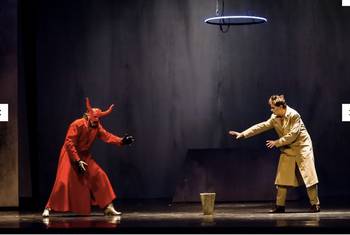Single News
An outstanding event: Viktor Ullmann’s opera The Fall of the Antichrist at the Goetheanum
A few days after the re-opening of the renovated Goetheanum stage in Dornach on 25 October, the Czech Moravian Theatre Olomouc gave a guest performance of Viktor Ullmann‘s three-act opera Der Sturz des Antichrist (The Fall of the Antichrist), based on Albert Steffen’s Dramatic Sketch. The musical director was Miloslav Oswald and the director Jan Antonin Pitínsky. NNA correspondent Wolfgang G. Voegele was there.
DORNACH (NNA) – The performance was preceded by an introductory lecture by the musicologist and Ullmann specialist Marcus Gerhardts. The newly built orchestra pit means that operas can now also be performed at the Goetheanum, even if (like the Bayreuth Festival Theatre) it has no opera ensemble of its own.
The Czech guests came from a city with a rich musical tradition: the eight-year-old Mozart wrote a symphony in Olomouc, Beethoven composed his Missa Solemnis for the inthronisation of his friend and patron the Archduke Rudolph as a cardinal and Archbishop of Olomouc, and, not least, Gustav Mahler, who worked there in his early years as a conductor.
Persecution
Viktor Ullmann (1898-1944), a pupil of Schoenberg who did not begin to be discovered again until after 1995, had suffered triple persecution under the Hitler regime: as a Jew, as an anthroposophist and as a composer of “degenerate music”. He was murdered in 1944 in the Auschwitz death camp but not before he had composed a series of important works in the Theresienstadt concentration camp, including The Emperor of Atlantis. Ullmann was a person who remained a seeker for the whole of his life with regard to his religious and world outlook. As a result his path led him through Judaism, Catholicism, Protestantism, freemasonry (his teacher Alexander Zemlinsky was a freemason) and anthroposophy.
Ullmann saw the Goetheanum for the first time in 1929, became a member of the Anthroposophical Society two years later and in 1938 performed his own compositions there at the invitation of Albert Steffen. That was his final journey abroad. All his plans to emigrate came to nothing and even friends who had already emigrated were no longer able to help before he was deported from Prague, first to Theresienstadt and then subsequently to the Auschwitz death camp.
The opera
The theme of the Antichrist had been taken up in art and literature in many different ways. Probably the best known was Vladimir Solovyov’s A Short Story of the Antichrist which became popular particular in anthroposophical circles.
Albert Steffen’s Dramatic Sketch, which was used by Ullmann for his libretto and which had been published in 1928 and had its premier under the direction of Marie Steiner in April 1933, prophetically anticipated the Hitler dictatorship. But it can also be related to other totalitarian regimes. A priest, a technician and an artist are subject to the diktat of a tyrant who wants to exploit their talents for his own ends; only the artist does not give in and thus brings about the fall of the dictator.
Ullmann had become acquainted with the text in Stuttgart, where he was involved for a time in the “Goetheanum-Bücherstube” bookshop, a project which ended in disaster. The score was completed at the end of 1935, a few days before the death of his revered Alban Berg, with whom he corresponded and for whom he wrote an obituary in the Goetheanum. In 1936 his opera won the prestigious Emil Hertzka Prize.
The jury was made up of Alexander Zemlinsky, Ernst Krenek and Egon Wellesz, all of them opera composers themselves. Ullmann hoped in vain that his opera would be premiered in Vienna in 1937 under Felix Weingartner. But political opposition was already stirring in Austria and in Prague the discrimination against Jewish artists was even worse. It was to be another sixty years before the premiere.
Colourful tonality
Musically the opera is a product of the Schoenberg school – not as a dogmatic twelve-note composition but in its independent, colourful tonality. Like Alban Berg, Ullmann also includes forms of absolute music such as the fugue in the dramatic events of the opera. Stylistic influences from Alexander Zemlinskys, under whom Ullmann worked as conductor at the Prague Theatre, are also unmistakeable.
Such a full orchestral sound has rarely been heard at the Goetheanum before now. The voices of the exclusively male singers were full and only rarely had trouble competing with the volume of the orchestra.
Ullmann’s inspired music deserves greater attention because in its sound and structure it can well hold its own with the music of other musical “greats” of the twentieth century.
The subtle inclusion of eurythmy was also appropriate for the piece, given that eurythmy is not something that is yet much seen in opera generally. Apart from being a pure work of art, this opera also communicates key ideas of the anthroposophical perspective of the world in the style of a mystery drama.
Outstanding event
However, the barrier to understanding in this respect remains so high, that introductory lectures will probably remain essential. They could also throw a light on the manichean component which is characteristic of Steffen: redemption of evil through good.
The audience at this first performance at the Goetheanum, many of whom had clearly come a long way, gave warm and long applause. This opera was an outstanding event in the artistic schedule at the Goetheanum.
END/nna/wgv
Item: 141215-01EN Date: 15 December 2014
Copyright 2014 News Network Anthroposophy Limited. All rights reserved.

